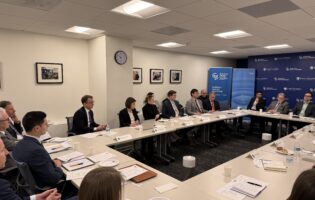Foreign Policy of Peacekeeping & Peacebuilding
Vice President of the German Bundestag and former Federal Minister of Research and Education Edelgard Bulmahn has been involved in conflict resolution and peacebuilding during her long career as a Member of Parliament. She is also personally committed to the issues of peacekeeping and peacebuilding. On the occasion of her visit in Washington, the Goethe-Institut organizes this panel on the role of art and culture in conflict situations and peacebuilding.
In spite of Sam Huntington’s assumption that after the collapse of the Soviet Empire, the world appears to be moving toward a clash of civilizations, we believe that culture and cultural dialogue can contribute to the mitigation and ultimately even to the prevention of conflict. In view of the current conflict situations in the Middle East, the United States and Europe are confronted with the harsh reality of violent conflicts with rather dramatic consequences for our common security. In the past, Germany acted primarily as a civilian power providing mostly humanitarian aid. But this record is changing. In Kosovo and Afghanistan, Germany did not hesitate to use military force as part of the Atlantic Alliance. Altogether some 10,000 German troops have been involved in military missions abroad, and on September 1, 2014 the German government decided to provide Kurdish forces with weapons in the fight against ISIS. Germany’s civilian power paradigm appears to be moving towards a more active military engagement.
With this panel discussion, the Goethe-Institut intends to contribute to a necessary discussion both here in the United States and at home about the implications of the changing German role in conflicts. How can we avoid a full militarization of the conflict in the Middle East? Is there still sufficient room for peacebuilding? How can cultural dialogue help to redirect politics into a more peaceful approach to conflict resolution? What are the cultural competencies needed to move from cultural activities for peacekeeping to cultural activities for peacebuilding? What role could culture (theater, arts, music, etc.) play in post-conflict humanitarian efforts? Can or should cultural interaction with refugees play a role in cultural activities and programs for their home countries?
Edelgard Bulmahn will take part in a conversation with the following panelists:
Maria J. Stephan is a senior policy fellow at the United States Institute of Peace (USIP) and a nonresident senior fellow at the Atlantic Council, where she focuses on the dynamics of civil resistance and their relevance for violent conflict prevention and democratic development.
Michael Shank is the Associate Director of Legislative Affairs at the Friends Committee on National Legislation in Washington DC. He is also Adjunct Faculty and a Board Member at George Mason University’s School for Conflict Analysis and Resolution, Board Member at Communities Without Boundaries International, and Senior Fellow at the Just Jobs Network and the Global Partnership for the Prevention of Armed Conflict.
Wilfried Eckstein is director of the Goethe-Institut Washington DC, and previously worked at the Goethe-Institut in Russia, Thailand and the People’s Republic of China.
Moderator: Dieter Dettke
Dieter Dettke served as the U.S. Representative and Executive Director of the Friedrich Ebert Foundation in Washington from 1985 until 2006. He currently teaches courses on ‘The Politics of European Security’ and ‘Russia and Europe: The New Security Dynamics at the Center for Security Studies’ as well as for the BMW Center for German and European Studies at Georgetown University.
Location
Goethe-Institut Washington
812 Seventh Street, NW Washington, DC 20001 United States







